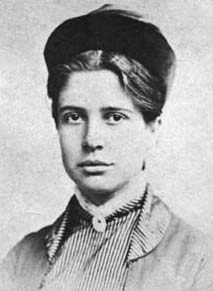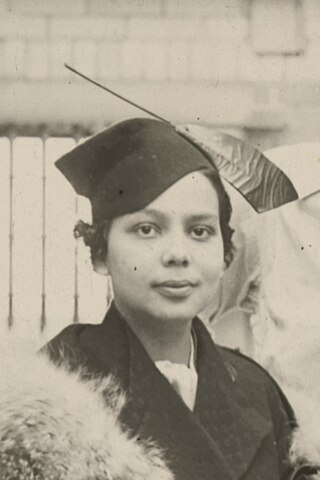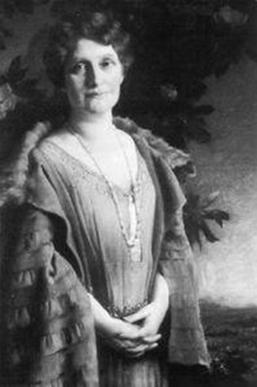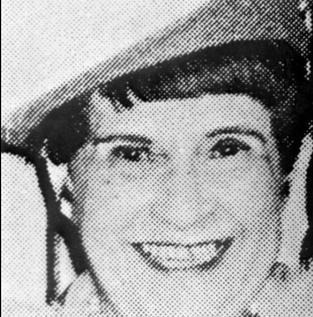Related Research Articles

Emmeline Pankhurst was a British political activist who organised the UK suffragette movement and helped women win the right to vote. In 1999, Time named her as one of the 100 Most Important People of the 20th Century, stating that "she shaped an idea of objects for our time" and "shook society into a new pattern from which there could be no going back". She was widely criticised for her militant tactics, and historians disagree about their effectiveness, but her work is recognised as a crucial element in achieving women's suffrage in the United Kingdom.

Laura Jane Addams was an American settlement activist, reformer, social worker, sociologist, public administrator, philosopher, and author. She was an important leader in the history of social work and women's suffrage in the United States. Addams co-founded Chicago's Hull House, one of America's most famous settlement houses, providing extensive social services to poor, largely immigrant families. In 1910, Addams was awarded an honorary master of arts degree from Yale University, becoming the first woman to receive an honorary degree from the school. In 1920, she was a co-founder of the American Civil Liberties Union (ACLU).

The League of Women Voters (LWV) is a nonprofit, nonpartisan political organization in the United States. Founded in 1920, its ongoing major activities include registering voters, providing voter information, and advocating for voting rights. In addition, the LWV works with partners that share its positions and supports a variety of progressive public policy positions, including campaign finance reform, health care reform, gun control and LGBT+ rights.

Carrie Chapman Catt was an American women's suffrage leader who campaigned for the Nineteenth Amendment to the United States Constitution, which gave U.S. women the right to vote in 1920. Catt served as president of the National American Woman Suffrage Association from 1900 to 1904 and 1915 to 1920. She founded the League of Women Voters in 1920 and the International Woman Suffrage Alliance in 1904, which was later named International Alliance of Women. She "led an army of voteless women in 1919 to pressure Congress to pass the constitutional amendment giving them the right to vote and convinced state legislatures to ratify it in 1920" and "was one of the best-known women in the United States in the first half of the twentieth century and was on all lists of famous American women."

William Dorsey Jelks was an American newspaper editor, publisher, and politician who served as the 32nd Governor of Alabama from 1901 to 1907. As Lieutenant Governor of Alabama, he also served as acting governor between December 1 and December 26, 1900, when Governor William J. Samford was out-of-state seeking medical treatment.

Patricia Nell Scott Schroeder was an American politician who represented Colorado's 1st congressional district in the United States House of Representatives from 1973 to 1997. A member of the Democratic Party, Schroeder was the first female U.S. Representative elected from Colorado.

Florence Moltrop Kelley was a social and political reformer and the pioneer of the term wage abolitionism. Her work against sweatshops and for the minimum wage, eight-hour workdays, and children's rights is widely regarded today.

Pattie Ruffner Jacobs was an American suffragist from Birmingham, Alabama. She was inducted into the Alabama Women's Hall of Fame in 1978.

Juanita Elizabeth Jackson Mitchell was born in Hot Springs, Arkansas, and was the first African-American woman to practice law in Maryland. She was married to Clarence M. Mitchell, Jr., mother of two Maryland State Senators, and grandmother of one.

Terrycina Andrea "Terri" Sewell is an American lawyer and politician. A member of the Democratic Party, she has served since 2011 as the U.S. representative for Alabama's 7th congressional district, which includes most of the Black Belt, as well as most of the predominantly black portions of Birmingham, Tuscaloosa, and Montgomery.

A poll tax is a tax of a fixed sum on every liable individual, without reference to income or resources. Although often associated with states of the former Confederate States of America, poll taxes were also in place in some northern and western states, including California, Connecticut, Maine, Massachusetts, Minnesota, New Hampshire, Ohio, Pennsylvania, Vermont and Wisconsin. Poll taxes had been a major source of government funding among the colonies which formed the United States. Poll taxes made up from one-third to one-half of the tax revenue of colonial Massachusetts. Various privileges of citizenship, including voter registration or issuance of driving licenses and resident hunting and fishing licenses, were conditioned on payment of poll taxes to encourage the collection of this tax revenue. Property taxes assumed a larger share of tax revenues as land values rose when population increases encouraged settlement of the American West. Some western states found no need for poll tax requirements; but poll taxes and payment incentives remained in eastern states. Poll taxes became a tool of disenfranchisement in the South during Jim Crow, following the end of Reconstruction. This persisted until court action, following the ratification of the 24th Amendment in 1964, ended the practice.

Hattie Wilkins was an American progressive era suffragist and women's rights activist who is best known for being the first woman elected to a seat in the Alabama Legislature. She was inducted into the Alabama Women's Hall of Fame in 1997.

Martha Kehres Roby is an American lawyer and politician who served as the U.S. representative for Alabama's 2nd congressional district from 2011 to 2021. A member of the Republican Party, she defeated the incumbent Democratic U.S. Representative Bobby Bright in 2010. That year, Roby and Terri Sewell became the first women elected to Congress from Alabama in regular elections. On July 26, 2019, Roby announced she would retire from Congress at the end of her fifth term, which ended in 2021.

Emma Jane Catherine Cobden was a British Liberal politician who was active in many radical causes. A daughter of the Victorian reformer and statesman Richard Cobden, she was an early proponent of women's rights, and was one of two women elected to the inaugural London County Council in 1889. Her election was controversial; legal challenges to her eligibility hampered and eventually prevented her from serving as a councillor.

Teresa (Katz) Thorne is an American writer and retired police captain.
Mildred June Tompkins Benson, commonly known as June Benson, (1915–1981) was the first woman to serve as mayor in the American State of Oklahoma when elected mayor of Norman in 1957 by city commissioners. Benson was inducted into the Oklahoma Women's Hall of Fame in 1985, thanks also to the significant contributions she made on voting rights and environmental protection.
The Con-Con Eleven were a group of eleven women delegates to the 1961-1962 Michigan Constitutional Convention. The group of eleven women were the first and only women to attend a Michigan Constitutional Convention. The eleven women were Vera Andrus (1896-1976), Ruth Gibson Butler (1891-1981), Anne M. Conklin (1925-1975), Katherine Moore Cushman (1916-1991), Ann Elizabeth Donnelly (1924-1984), Daisy Elizabeth Elliott (1919-2015), Adelaide Julia Hart (1900-1995), Lillian Hatcher (1915-1998), Dorothy Leonard Judd (1898-1989), Ella Demmink Koeze (1905-1986) and Marjorie Frances McGowan (1930-1980).

Anne Ackerman was an American political activist. After retiring to Florida in 1969, Ackerman organized thousands of residents of condominiums near where she lived into a politically active group. Condominium residents turned out at very high rates and were recognized as a powerful force in the state's politics: politicians running for local and national office sought Ackerman's endorsement.

The women's poll tax repeal movement was a movement in the United States, predominantly led by women, that attempted to secure the abolition of poll taxes as a prerequisite for voting in the Southern states. The movement began shortly after the ratification in 1920 of the Nineteenth Amendment to the United States Constitution, which granted suffrage to women. Before obtaining the right to vote, women were not obliged to pay the tax, but shortly after the Nineteenth Amendment became law, Southern states began examining how poll tax statutes could be applied to women. For example, North and South Carolina exempted women from payment of the tax, while Georgia did not require women to pay it unless they registered to vote. In other Southern states, the tax was due cumulatively for each year someone had been eligible to vote.

Myrna Pérez is an American lawyer serving as a United States circuit judge of the United States Court of Appeals for the Second Circuit. She was previously the director of voting rights at the Brennan Center for Justice.
References
- 1 2 3 "Alabama Women's Hall of Fame ' Jane Lobman Katz". www.awhf.org. Retrieved 2017-11-04.
- ↑ Rechcigl, Miloslav Jr. (2016-11-10). Encyclopedia of Bohemian and Czech-American Biography. AuthorHouse. ISBN 9781524620691.
- ↑ Discover St Clair website